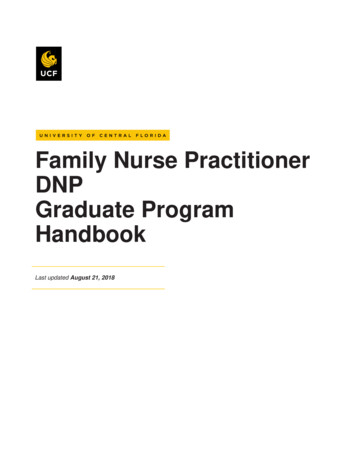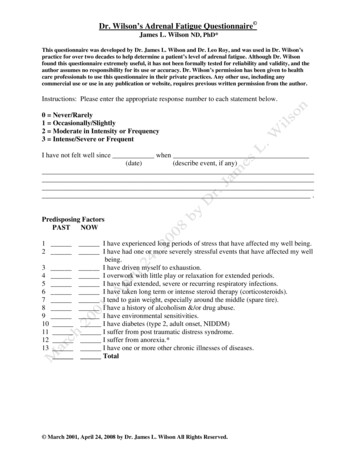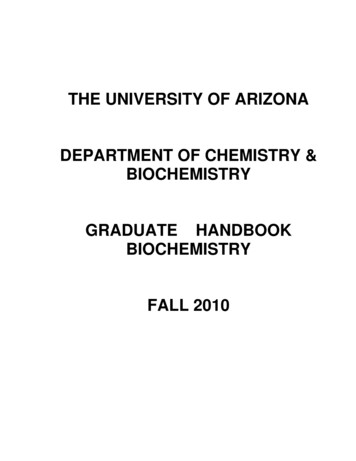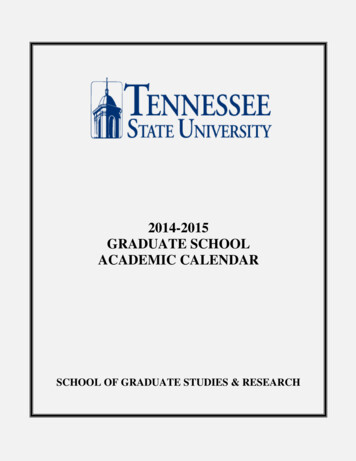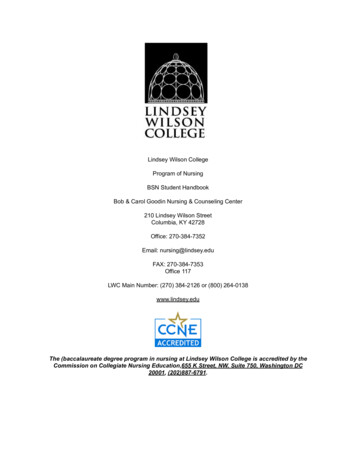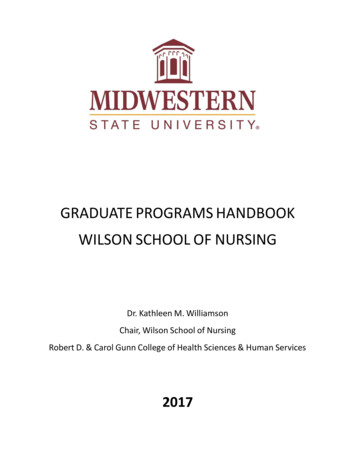
Transcription
GRADUATE PROGRAMS HANDBOOKWILSON SCHOOL OF NURSINGDr. Kathleen M. WilliamsonChair, Wilson School of NursingRobert D. & Carol Gunn College of Health Sciences & Human Services2017
TABLE OF CONTENTSSECTIONMission/Values/Goals Statements University Mission Statement/Values Gunn College of Health Sciences and Human Services Wilson School of NursingPAGE2General Information Student Fees/Tuition Scholarships Additional Fees Distance Education Americans with Disabilities ActAdmission Admission Process Admission Deadlines Admission Requirements Compliance Packet Conditional/Unconditional Admission Admission Decisions Transfer Credit Full-Time Status Time Limit for Completion of ProgramDegree/Completion Plans Degree Requirements Post-Graduate Programs Course Drop Policy Progression Policy Proctored Exams AttendanceClinical Experience Information Affiliation Agreements Preceptor Agreements Clinical Experiences Where Employed Required Dress/UniformsCurriculum Framework Nursing Core Family Nurse Practitioner Options Psychiatric Mental Health Nurse Practitioner Options Nurse Educator OptionsEvidence-Based Project Project Approval Final Project Presentation469121418
University Mission StatementMidwestern State University is a leading public liberal arts university committed to providingstudents with rigorous undergraduate and graduate education in the liberal arts and theprofessions. Through an emphasis upon teaching, augmented by the opportunity for students toengage in research and creative activities alongside faculty and to participate in co-curricular andservice programs, Midwestern State prepares its graduates to embark upon their careers or pursueadvanced study. The university’s undergraduate education is based upon a comprehensive artsand sciences core curriculum. The understanding that students gain of themselves, others, and thesocial and natural world prepares them to contribute constructively to society through their workand through their private lives.OUR VALUES: Excellence in teaching, learning, scholarship, and artistic production Intellectual curiosity and integrity Critical thinking Emotional and physical well-being Mutual respect, civility, and cooperation Social justice Civic service Stewardship of the environment, and of financial and human resources A safe, attractive, and well-designed campusRobert D. and Carol Gunn College of Health Sciences and Human ServicesMission StatementIn keeping with Midwestern State University’s mission to provide students with rigorousundergraduate and graduate education in the liberal arts and the professions, the Robert D. andCarol Dunn College of Health Sciences and Human Services education seeks to be a premierprovider of health sciences and humans services education on a state, national, and internationallevel by providing learners with the tools for success through: Student-centered undergraduate and graduate professional education built upon a strongliberal arts foundation;Engagement in traditional and applied research opportunities alongside faculty acrossdisciplines and within their chosen professions;Cutting edge educational programs that meet the needs of our global community;Graduate Student HandbookPage 2
Recognition and respect for diversity of thought;Interdisciplinary collaboration with professionals in the global community;Emphasis on scholarly teaching, practice, scientific inquiry, and service;Ethical professional practice and an appreciation for continuous life-long learning.John and Nevils Wilson School of NursingMission StatementThe John and Nevils Wilson School of Nursing is accredited by theCommission on Collegiate Nursing Education (CCNE)It is the mission of the John and Nevils Wilson School of Nursing at Midwestern StateUniversity to prepare nurses who will provide competent and compassionate health care toindividuals, families, groups, and communities (IFGC). The nursing faculty values teaching /learning in an individualized, collegial environment inclusive of a variety of teachingmethodologies. Building on a liberal arts foundation, this approach to both undergraduate andgraduate nursing education develops students as leaders through collaborative identification ofissues, and the implementation of innovative, creative solutions to the provision of healthservices.John and Nevils Wilson School of Nursing GoalsSuccessful graduate of the Wilson School of Nursing should be able to: Compare favorably with national norms for professional practice Be employed in professional practice Manage multiple, complex clients in a variety of settings Demonstrate leadership within the professional disciplineThe Wilson School of Nursing at MSU will provide: Student-centered education Innovative educational programs that meet the needs of our local and global community Interdisciplinary collaboration with the practice community Scholarly teaching, practice, inquiry, research, and serviceGraduate Student HandbookPage 3
GENERAL INFORMATIONStudent Fees/TuitionStudent fee information is published each semester in the Schedule of Classes located on theOffice of the Registrar’s web page. It can also be found in the Graduate Catalog located on theBillie Doris McAda Graduate School webpage. Financial aid information can be found athttp://www.mwsu.edu/finaid or by calling 940-397-4214.Information concerning a waiver of non-resident tuition can also be found in the graduate catalogor through the Office of the Registrar. There is a significant difference in the tuition for in-stateand out-of-state students. If a class is offered completely online, the tuition is the same as in-statetuition.ScholarshipsStudents may apply for a scholarship to help defray some expenses. If an award of at least 1,000 is received, the student will have a tuition waiver which means the student, if livingoutside of the State of Texas, will pay in-state tuition. The application for scholarship is locatedon the Wilson School of Nursing webpage.Additional Required FeesStudents will be expected to pay for additional fees specific to the graduate nursing programssuch as Clinical Log fees. This is a web-based program the tracks your clinical experiences andhours. Students will be expected to pay for testing related fees. These amounts and requirementsmay change from semester to semester or year to year depending on organizations andinstitutions providing these services. All fees are paid through the business office.Liability insurance provides coverage for advanced practice nursing student’s clinicalexperiences. Insurance must be purchased prior to the first clinical rotation. Insurance coveragefrom other institutions or hospitals or private companies will not meet the MSU requirement forliability coverage. Insurance must be purchased through the MSU Business Office.The student is also responsible for fees associated with criminal background checks and drugscreens.Distance EducationMidwestern State University is obligated to comply with existing state laws regarding distanceeducation. The Wilson School of Nursing graduate nursing programs considers distanceeducation to include 100% online programs, online programs that require some on-the groundexperiences, and certificate programs delivered to students outside the state of Texas. State lawsGraduate Student HandbookPage 4
regarding distance education vary state-by-state, and even program-by-program within a state.Consequently, compliance with each state authorization requirements is an ongoing process.All of the graduate nursing programs offered at Midwestern State University trigger a physicalpresence in the state of residence and may require prior authorization or permission from thestudent’s state of residence before admission to the program. For further information contact theCenter for Continuing Professional and Distance Education webpage under the Out of StateInstructions page.Americans with Disabilities ActThe following is the faculty approved ADA/504 statement: Midwestern State University does notdiscriminate on the basis of an individual’s disability and complies with Section 504 and theAmericans with Disabilities Act in its admission, accessibility, and employment of individuals inprograms and activities.MSU provides academic accommodations and auxiliary aids to individuals with disabilities, asdefined by law, who are otherwise qualified to meet academic employment requirements.Students with a disability must be registered with Disability Support Services (DSS) beforeclassroom accommodations can be provided. For assistance, call the campus Disability SupportServices office at 940-397-4140.It is the student’s responsibility to declare any disabilities. After declaration with the DSS,preferably at the beginning of each semester, the student needs to contact his/her individualinstructors to determine any reasonable accommodations that may be required.University PoliciesUniversity policies regarding academic misconduct, discrimination, harassment, grievances,sanctions, and appeals etc. can be found in the MSU Student Handbook located on the MSUhome page under the Student Life Menu and/or the Graduate Catalog.ADMISSION TO THE GRADUATE NURSING PROGRAMSApplication ProcessApplicants desiring admission to the graduate nursing programs must complete two (2)applications. One application is to the University through “Apply Texas” and the other is theWilson School of Nursing Application which is program specific. Both applications areavailable on the Wilson School of Nursing home page as well as the Billie Doris McAdaGraduate School home page. Further information regarding these applications or the applicationprocess should be directed to the Billie Doris McAda Graduate School. Official transcripts forGraduate Student HandbookPage 5
all colleges or universities attended must be sent directly to the Billie Doris McAda GraduateSchool.Admission DeadlinesThe Family Nurse Practitioner and the Psychiatric Mental Health Nurse Practitioner programsadmit full-time master’s degree-seeking students in the fall semester. Post-graduate certificatestudents may be considered for admission in the spring or summer sessions based on spaceavailability. Transfer credit is awarded for previous graduate coursework.There are a limited number of student positions available. Prospective students are encouraged tosubmit the required documentation and applications as soon as possible. The deadline forcompleted applications, submission of official transcripts, and GRE scores (if required) is postedon the Wilson School of Nursing website. There will be no exceptions.Admission Requirements1. An earned baccalaureate degree in nursing from a Department of Education recognizedaccrediting body of nursing program;2. Current RN license to practice in any compact state and/or any other state relevant tostudent’s clinical experience;3. A GPA of at least 3.0 on the last 60 hours of undergraduate work exclusive of credithours awarded by a two-year college;4. GRE or GRE ScoreItNow official test scores;5. Basic undergraduate statistics course (3 semester hours);6. Interview with Graduate Coordinator, Program Clinical Coordinator and/or GraduateFaculty;7. Evidence of basic physical assessment content in undergraduate program or completionof approved physical assessment continuing education course. Students may be requiredto demonstrate competence in physical assessment skills if most recent content exposureand/or clinical experience occurred more than 3 years prior to admission.8. Completed Compliance Packet.Compliance PacketStudents admitted to the graduate nursing programs will receive a compliance packet containinginformation on required immunizations, drug screens, criminal background checks, CPRverification, and nursing license verification. It is the student’s responsibility to make sure thecompliance packet is completed prior to the specified deadline. Students will be instructed toaccess the third party company selected by the Wilson School of Nursing.Information about specific immunization requirements is located on the Wilson School ofGraduate Student HandbookPage 6
Nursing homepage. Students who live out-of-state and who plan to complete clinical hours intheir state of residence may have additional immunization requirements. Students must becompliant with immunization requirements prior to the start of any course with a clinical/labcomponent.The expenses of submitting the required documents for verification and compliance are theresponsibility of the student. As part of the process, students will authorize the third partyscreening company to release results to the Wilson School of Nursing.Conditional/Unconditional AdmissionsStudents are admitted with an Unconditional or Conditional admission status. The conditions foradmission are listed in Graduate Catalog which can be found on the Registrar’s homepage andthe Billie Doris McAda Graduate School homepage.Conditional admission will have additional requirements, courses, grades or time lines thatstudents must meet to satisfy the condition of admission. If conditions are not met as outlined,the student will be subject to removal from the program.Admission DecisionsAdmission decisions are made by the Graduate Coordinator in consultation with the GraduateCurriculum and Standards Committee, and based on the student’s GPA, prior nursing experience,GRE scores, and personal interview scores.Transfer CreditThere is no automatic transfer of credit hours earned at another institution; however, in general, amaximum of 6 semester hours of approved graduate work completed at another at anotheruniversity maybe accepted for transfer credit. Only courses with a grade of “B” or better will beconsidered for transfer credit.In special circumstances and with approval from the Graduate Coordinator, the Dean of GunnCollege of Health Science and Human Services, and the Dean of the Billie Doris McAdaGraduate School, transfer credit for up to 12 hours maybe granted. All requests for transfer creditmust be sent to the Graduate Coordinator.Clinical courses will not be considered for transfer credit. Advanced Health Assessment,Advanced Pharmacology, and Advanced Pathophysiology courses must have been completedwith an earned grade of a “B” or better and taken within the last 5 years to be considered fortransfer credit.Post-graduate certificate students who currently hold an advance practice nurse license, haveGraduate Student HandbookPage 7
current prescriptive authority in the state in which they practice, and have practiced in theircertified specialty within the last 3 years, may transfer Advanced Health Assessment, AdvancedPharmacology, and Advanced Pathophysiology with the approval of the Graduate Curriculumand Standards Committee.Correspondence courses and military educational experience (ACE credit) are not accepted forgraduate credit.Full-Time StatusThe Wilson School of Nursing MSN program considers 6 credit hours per semester as full-timestatus. There are no official part-time tracks in the Graduate Nursing programs.Time Limit for Completion of the Graduate Nursing ProgramsThe Masters of Science in Nursing must be completed within seven (7) calendar years from thedate of enrollment in the first course applied to the degree. Family Nurse Practitioner studentswho do not graduate at the end of the semester in which they complete NURS 5371/74 mustremain continuously enrolled in NURS 6911 in which 64 clock hours of advanced clinicals mustbe completed each semester. Psychiatric Mental Health Nurse Practitioner students who do notgraduate at the end of the semester in which they complete NURS 5401/04 must remaincontinuously enrolled in NURS 6911 in which 64 clock hours of advanced clinical must becompleted each semester.Courses completed more than 7 years prior to graduation date may be repeated or replaced unlessthe student evidences competency as determined by the graduate coordinator and approved bythe Graduate Dean.DEGREE/COMPLETION PLANSDegree RequirementsThere are three (3) tracks within the graduate nursing program. Each track has a specificcontent focus relative to the roles of family nurse practitioner, psychiatric mental health nursepractitioner, and nurse educator (the nurse educator program is not accepting new students and isbeing taught out). At this time there are no dual tracks offered at MSU.Once admitted to one of the graduate programs, the student will receive a degree plan created bythe program coordinator. Students must agree to the degree plan either by signature on the degreeplan or by confirmed consent in an e-mail directed to the graduate coordinator.The degree plan will then be sent to the registrar’s office after appropriate administrativeGraduate Student HandbookPage 8
signatures have been obtained. Student’s MUST adhere to the degree plan as developed. Failureto do so may result in a delay in program completion and/or removal from the program.Requests to change the degree plan must be cleared with the graduate coordinator prior toregistering for courses. If student has registered for a course that is not on the current degreeplan, the student may be administratively dropped from that course.Post Graduate ProgramsAn applicant who has earned an MSN from a Department of Education recognized accreditingbody of nursing programs may be accepted into the Family Nurse Practitioner Program or thePsychiatric Mental Health Nurse Practitioner Program in pursuit of a certificate. The programconsists of advanced nursing practice courses mandated by the Texas Board of Nursing.Nursing Education courses may also be taken by an applicant with an MSN from a Departmentof Education recognized accrediting body of nursing programs and/or a master’s degree inrelated field from an accredited institution maybe accepted into the Nurse Educator program toearn a certificate in Nursing Education or to meet the Texas Board of Nursing requirements forteaching in a nursing program provided the applicant holds a BSN degree. This track is beingtaught out and no longer accepting new students.Course Drop PolicyIf it becomes necessary to drop a course for any reason, the student must notify the instructor inthe course as well as the graduate coordinator of intent to drop. The student will then be given arevised degree plan if necessary.Some courses are only offered once a year or in selected semesters. Dropping a course from theoriginal degree plan can delay graduation or program completion dates.Repeatedly dropping courses is not recommended and the student may be required to submit aletter to the Graduate Curriculum and Standards Committee to remain in the program. Ifextenuating circumstances exist and the student must drop a course more than once, the studentmust consult the graduate coordinator.Progression PolicySatisfactory progression in MSU graduate nursing program is defined as a 3.0 or bettercumulative grade point average and no grade lower than a “B” in the nursing courses.1. If a grade of “C” or lower is earned in any graduate nursing course, the course must besuccessfully repeated the next regular academic semester during which the course isoffered. Failure to achieve the minimum grade of “B” when repeating a course will resultGraduate Student HandbookPage 9
in dismissal from the program. Students may petition the Graduate Curriculum andStandards Committee to accept a repeated course from another university in advance ofenrollment for the course; however, the original grade will remain on the transcript andwill be calculated into the grade point average. The only way to remove the grade fromthe GPA calculation is to retake the course at MSU.2. A student who fails to successfully complete a nurse practitioner clinical major courseeither by dropping the course during the semester or by earning less than a “B” will berequired to register for and satisfactorily complete (minimum grade of “B”) a onesemester credit hour special topics course for each semester until retaking the dropped orfailed course. Clinical major courses for FNP students include NURS 5166, NURS5182/84, and NURS 5371/74. Clinical major courses for PMHNP students include,NURS 5366, NURS 5382/84, and NURS 5401/04. The purpose of the special topicscourse is to maintain clinical competence. The course will consist of 64 clinical hoursunder the direction of an FNP or PMHNP faculty member. Clinical hours that wereearned during the dropped or failed course will be forfeited. Clinical hours earned duringthe special topics course will be in addition to the minimum required clinical hours forthe FNP and PMHNP Programs. Clinical hours will be required for NURS 5382/84,NURS 5401/04, NURS 5182/84, and NURS 5371/74.3. A student who earns lower than a “B” in any two graduate nursing courses either thesame course twice or two different courses will be dismissed from the program.Readmission will be considered by the Graduate Curriculum and Standards Committeeon an individual basis.Additional information on the progression policy can be found in the Graduate Catalog.Proctored ExamsSome courses will require proctored exams. Proctor exam forms or instructions will be includedin the syllabus or within the course content. It is the responsibility of the student to schedule testtimes with an appropriate exam site and to pay the fees required of the testing center.Test times are scheduled by the faculty or instructor and once posted in the syllabus will not bechanged except during extreme circumstances such as power outages in areas of severe weather.Students may request a different test date and time for extreme personal circumstances such ashospitalization. It is the student’s responsibility to notify the course faculty if experiencingpersonal circumstances that prevent taking the test at the scheduled time. Conflicting workschedules will not be considered as extreme circumstances.Graduate Student HandbookPage 10
AttendanceEach course syllabus addresses the procedures and consequences for absence from requiredclassroom experiences and/or examinations. The student is expected to review these statementsand comply with procedures established by the course faculty. Faculty are not required toreschedule classroom time or provide make-up tests.Some graduate courses require on-campus classroom or presentation times. Please check thesyllabus for required class or presentation dates. Total on-line programs may require students tocome to campus up to 4 times during the program. All travel expenses are the responsibility ofthe student.CLINIC EXPERIENCE INFORMATIONClinical experiences are the responsibility of the student. A student may not start a clinicalrotation or complete any hours until approved by the clinical faculty advisor. Hours completedwithout approval will not be calculated into the required clinical hours for program.Clinical hours can be completed in the state in which the student is licensed to practice nursing.Nurse Practitioner (FNP and PMHNP) students are required to obtain a Texas license in additionto their current state license, unless their state of residence is a compact state. FNP and PMHNPstudents may be required to complete some clinical hours in Texas. Graduate students may berequired to complete a portion of their clinical hours with the graduate faculty. Students mayalso be assigned a specific preceptor or clinical site at the recommendation of the facultyadvisor.Required clinical hours are posted in the syllabus of the clinical course. The faculty advisor orprogram coordinator may require a student to take additional hours beyond those required in thecourse in special circumstances. The need for additional hours will be discussed with the studentand the graduate coordinator.Affiliation AgreementsThe Affiliation Agreement is a mandatory agreement between MSU and any institution, hospital,or clinic where a student is present. Students may not complete clinical hours at any institutionthat does not have an affiliation agreement signed by that institution’s administration and MSU.Affiliation Agreements may take up to 3 or 4 months for signatures and it is advised studentsstart the process early. The first step is to check with the Wilson School of Nursing to inquireabout the pre-existence of an agreement. The agreement is updated yearly and only requires oneagreement per institution. If an agreement exists and is current there is nothing more to do. If anGraduate Student HandbookPage 11
affiliation agreement does not exist, the student can retrieve a form from the Wilson School ofNursing Website. The completed form should be turned into the Wilson School of Nursingsecretary. This will start the process. The student will then wait until notification by MSU thatthe agreement has been signed. It is the student’s responsibility to ensure an affiliation agreementis in place prior to the start of any clinicals. Hours completed prior to a valid agreement will notbe calculated into the required clinical hours for the program.Preceptor AgreementsAll preceptors and clinical sites must be approved through the clinical faculty advisor. Allpreceptors must complete and sign the preceptor agreement each semester for each student. Acurrent list of preceptors can be obtained from the Wilson School of Nursing. Preceptoragreements can be found on the Graduate Nursing Webpage.It is the student’s responsibility to ensure that they have an approved clinical site with anapproved preceptor and a signed preceptor agreement. Student’s will retain a copy of the signedpreceptor agreement in their clinical journal and send the original to the Wilson School ofNursing. A preceptor agreement must be signed each semester even if the student completes allof their clinical hours for the program with a single preceptor.Clinical Experiences Where EmployedOn occasion, graduate students may have clinical experiences in their places of employment. TheMSN programs assume no responsibility for the performance and actions of nursing studentswhile in the clinical setting other than those times specified as a clinical learning experience. It isadvised that if possible, the student seek out clinical sites away from the institution of currentemployment. If that is not possible the following criteria must be met:1. The clinical hours must be in areas other than the usual work setting.2. The clinical site must meet the objectives for the clinical component of the master’s levelcourse.3. The clinical site must be approved by the faculty advisor.4. The student must not remunerated (paid) by the institution.5. No double dipping (on the clock and clocking clinical hours).Required Dress/UniformsCourse syllabi provide information about uniform requirements for clinical experiences. If nouniform is specified, the student should dress in a professional manner appropriate to the clinicalsetting and wear a name tag designating him/her as an MSU graduate nursing Student.Texas law requires a photo ID for students in hospital clinical environments. It is the student’sresponsibility to know the ID and orientation requirements of each institution PRIOR to anyGraduate Student HandbookPage 12
clinical rotation.Standardized name tags are available to BJD Engraving, 2515 Kemp Street, Wichita Falls, TX(940-322-1014). It is the student’s responsibility to order the name tag and provide payment.Name tags can be ordered over the phone and mailed to the student. Information on the nametag will include:First name Last name, credentials (BSN, RN) or (MSN, RN)Student Status: FNP Student, PMHNP Student, Nurse Educator StudentCURRICULUM FRAMEWORKThe Wilson School of Nursing adopted the AACN Essentials for Masters Education as theorganizing framework for the core curricula of the Master’s Programs. The Nurse PractitionerPrograms adopted the National Organization of Nurse Practitioner Faculties (NONPF) CoreCompetencies and the Population Focus Specific FNP and PMHNP Competencies. The NurseEducator Program adopted the National League for Nursing (NLN) Core Competencies forNurse Educators. Specific essentials and competencies are aligned with individual courseobjectives and can be found on course syllabi.CURRICULA FOR THE GRADUATE PROGRAMSAll degree-seeking students in the Graduate Programs are required to take a core of nursingcourses as listed below. Various options, Family Nursing Practitioner, Psychiatric MentalHealth Nurse Practitioner, and Nurse Educator options are listed on the following pages.Family Nurse Practitioner Program MSN SequenceFallSpringSummerYear 1CourseNURS 5023 - Research in NursingSCH3Year 2CourseNURS 5166 - Advanced Practice across theLifespanNURS 6853 - EBP 2SCH6NURS 5283 - Role of the AdvancedNurse PractitionerNURS 5103 - Theory3NURS 5043 - Pathophysiology3NURS 5182 - Advanced Practicum I2NURS 5133 - Pharmacotherapeuticsin Advanced Nursing PracticeNURS 6843: EBP 1343NURS 5184 - Advanced Practicum IClinicalNURS 6863 - EBP 3NURS 5112 - Health Assessment forAdvanced Nursing Practice & Clinical2NURS 5371 - Advanced Practicum II1Graduate Student Handbook333Page 13
NURS 5111 - HA ClinicalYear 1NURS 5123 - Population Health inGraduate NursingNURS 5101 - DiagnosticsStudies/Ambulatory ProceduresSub-total1NURS 5374 - Advanced Practicum II ClinYear 243125Sub-totalTOTAL SCH for Degree2348Family Nurse Practitioner Post-Graduate Certificate SequenceYear 1CourseSCHFallSpringSummerYear 2CourseNURS 5166 - Advanced Practice across theLifespanNURS 5283 - Role of the Advanced NursePractitionerSCH63NURS 5043 – Pathophysiology3NURS 5182 - Advanced Practicum I2NURS 5133 - Pharmacotherapeuticsin Advanced Nursing Practice3NURS 5184 - Advanced Practicum IClinical4NURS 5112/11 - Health Assessmentfor Advanced Nursing Practice &ClinicalNURS 5123 - Population Health inGraduate NursingNURS 5101 - DiagnosticsStudies/Ambulatory ProceduresSub-total3NURS 5371 - Advanced Practicum II13
Consequently, compliance with each state authorization requirements is an ongoing process. All of the graduate nursing programs offered at Midwestern State University trigger a physical presence in the state of residence and may require prior authorization or permission from the student's state of residence before admission to the program.
